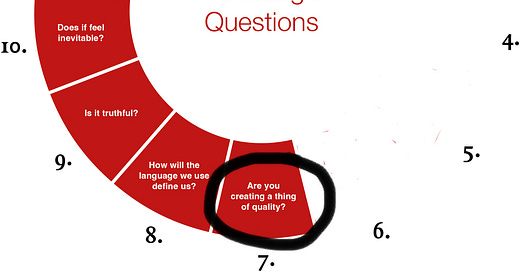Quality is one of those words that I think has morphed and become horribly diluted when it comes to business.
The etymology of the word stems from “temperament, character, disposition” - qualities that define us - but seems to have migrated to a subset of managerialism to become “making organisations perform for stakeholders”.
It’s one of those words that seems to have sold out to money rather than its respecting its heritage.
When it comes to New Artisans, I’m happy to leave stakeholders to their own short-term devices and consider quality in greater depth. How do we ensure originality, imagination, and curiosity take centre stage as the fuel cells for creating things of substance and value, and which, touching for a moment on question 13, leave a legacy?
I think it is about paying attention to what not to do, those easy apps and processes that appear to make life easy, but effectively neuter critical thinking. It’s about considering the longer term and avoiding a blind obsession with goals as gods and a willingness to maintain any belief in the face of contradictory evidence in order to comply with dogma and performance ratings.
It has a lot to do with our relationship with uncertainty and moving from the futility of trying to eliminate it, to finding ways to harness it. To appreciate what we have available and work with it to the best effect where we find ourselves without being blinded by OPGs (Other People’s Goals) in a process I have come to understand as “effectuation”
…a way of thinking and decision-making that is based on the idea that entrepreneurs create their future by taking action and making things happen. It is a way of thinking that is focused on creating opportunities and solving problems by using the resources that are available to you, rather than making predictions and trying to plan for the future.
Above all, in the context of New Artisans, at the heart of quality is the conversations we have. Mutually supportive and “no holds barred” in search of what matters, and which often uncover parts of ourselves that startle us (and frighten the living daylights out of organisations that depend on compliance and conformity)
To respect the true meaning of quality as temperament, character, and disposition.
So yes, I believe we can make New Artisans a thing of quality - even if (or maybe necessarily) it means alarming a few people along the way.
I’d like New Artisans to comprise powerful, uncompromising conversations where we can escape the imposed mediocrity of the meeting room to spend time with those we trust and allow the power, originality and potential of our individual ideas and dreams to be revealed and developed.




